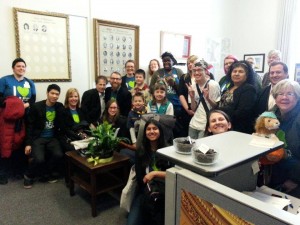 Social Studies
Social Studies  2 Comments
2 Comments Wade in the Water
 Last Sunday, I attended a training for white folks who do racial equity work. The organizers called it “Solidarity Training,” and that’s as good as anything, but what it really meant was this: “How not to be a racist asshole as you try to improve things for people of color.”
Last Sunday, I attended a training for white folks who do racial equity work. The organizers called it “Solidarity Training,” and that’s as good as anything, but what it really meant was this: “How not to be a racist asshole as you try to improve things for people of color.”
You’d think that would be easy—every person in that room was there because they have the very best of intentions. We were all pretty far along our own personal journey from ignorance that white is even a race, toward leveraging our privilege to help dismantle systemic racism. Many of us had been doing that work for years, some even for decades.
But the hardest thing for people who are in the group in power is to realize that intention is not enough. Just because you *meant* it to be flattering when you tell a woman she’s sexy as she walks by doesn’t make it so to the women who experience unwanted street harassment every day. Just because you *meant* it to be a compliment when you tell a young black man that his speech was “so articulate and inspiring” doesn’t mean that won’t feel condescending to men who meet with surprise every day when they show that they’re educated. Intention does NOT get the job done.
But it can be surprisingly difficult to tell the difference between fighting the system and benefitting from the system. One of the trainers, the inspired and inspiring Ricardo Levins Morales, used an analogy out of the physics world to explain how we can be oblivious of something so pervasive. When you jump out of a plane at 30,000 feet, he says, you feel like you’re falling at first. But after a bit, the feeling changes to be something closer to floating, because you’re falling at the speed of gravity.
So it is with racism. White people are born onto a nice, big, comfy raft that floats atop the stream of racist oppression. Because we’re on the raft, we don’t feel the constant pressure of the water that wears down the hearts and souls of our brown and black siblings. We don’t feel the struggle. And even if we climb off that raft and join hands and weather the stream together for a bit, somehow—maybe it’s with a job referral from a friend, or a previewed house listing before it’s really “on the market”—we find ourselves back onboard, despite our best intentions.
The raft ride has been particularly bumpy at various points in history—now, since Ferguson, is one of them. It happens because some people in the water try to climb on the raft. At the same time, some of the raft’s riders are trying to dismantle the raft itself, or jump into the water in solidarity. And the people who never even knew they were on a raft of history and privilege get nervous and frightened at having why they thought was a solid, level surface become so unstable.
Naturally, this made me think of GamerGate.
See, sexism is another river, and patriarchy is another raft. Movements like GamerGate and the MRAs (Men’s Rights Activists) exist in a moment where the rather splendid vehicle created by cisgendered, heterosexual, white patriarchy is under attack from all sides. Its riders didn’t notice that the river around them was rising, or that the ship’s own crew was changing. The new crew wants to park that vessel for good, and move everyone to a bigger ship with room for all the groups who’ve had to struggle upstream for centuries. That must feel terrifying to people who thought they were on solid ground, riding as they were at the combined speeds of so much privilege.
The fact is, though, that the river’s already flooded its banks. There are too many oppressed people, and allies who prefer to be in the water, to float along in ignorance anymore. Women have been in games for a long time, and all the yelling and threats in the world can’t make that river flow upstream.
 Toward the end of the training, Ricardo announced that he would be distributing cards. I could see the little deck in his hand, but I had no idea what he meant to do with them. A surprising, somewhat unnatural ripple of excitement spread through the crowd, though; I wondered if they knew more about the cards than I did. When I got mine, it had a piece of art on one side, with a slogan from the disability rights movement: “Nothing about us, without us, is for us.” On the other side were some check-in questions to help us stay grounded when we feel compelled to act in a racially charged situation: “Why do I feel an urge to act/not act?” and “Who will benefit from my action/inaction?”
Toward the end of the training, Ricardo announced that he would be distributing cards. I could see the little deck in his hand, but I had no idea what he meant to do with them. A surprising, somewhat unnatural ripple of excitement spread through the crowd, though; I wondered if they knew more about the cards than I did. When I got mine, it had a piece of art on one side, with a slogan from the disability rights movement: “Nothing about us, without us, is for us.” On the other side were some check-in questions to help us stay grounded when we feel compelled to act in a racially charged situation: “Why do I feel an urge to act/not act?” and “Who will benefit from my action/inaction?”
The ripple quieted down as people examined their cards, and I wondered if the people who’d been a-flutter with excitement were disappointed by the card they got. I wondered if the one they’d wanted would’ve just said, “I’m one of the good ones.” That’s what white people doing racial equity work really want, after all—a card that credentials them as not racist, as a proven ally. The problem is, it doesn’t work like that at all. “Ally” isn’t a title you earn; it’s a status you have to prove over and over again, mainly by just continuing to show up for what matters to communities of color. And nobody’s going to give you a cookie for doing the right thing, just like nobody’s going to give you a free pass when you mess up (and you WILL mess up, over and over).
I know a lot of guys in the world of games who probably wish they had that a “One of the Good Ones” card too. If I had them to give out, I can think of dozens of people who deserve them for living and working and playing by the guiding principles of inclusion and equity.
But that’s not how it works. Nobody gets a free pass; nobody gets a laminated card that’s good forever after. We climb off the raft, and we join hands with the people in the water and weather the current for as long as we can. At the same time, we accidentally get back on, and sometimes even block others from climbing aboard with us.
Maybe the card we really need is the one that says, “Time to get in the water again.”


